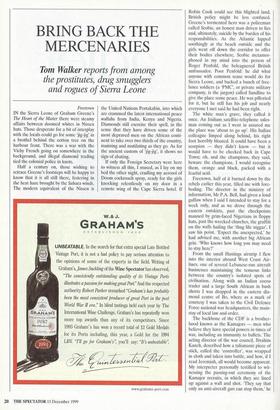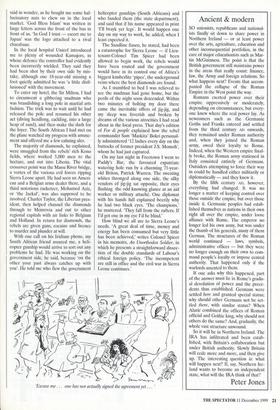BRING BACK THE MERCENARIES
Tom Walker reports from among the prostitutes, drug smugglers and rogues of Sierra Leone
Freetown IN the Sierra Leone of Graham Greene's The Heart of the Matter there were steamy affairs between doomed whites in Nissen huts. Those desperate for a bit of interplay with the locals could go for some `jig-jig' in a brothel behind the cotton tree on the harbour front. There was a war with the Vichy French going on somewhere in the background, and illegal diamond trading tied the colonial police in knots.
Half a century on, those wishing to retrace Greene's footsteps will be happy to know that it is all still there, festering in the heat haze brought by the Sahara winds. The modern equivalent of the Nissen is the United Nations Portakabin, into which are crammed the latest international peace wallahs from India, Kenya and Nigeria. Diamonds still exercise their spell, in the sense that they have driven some of the most depraved men on the African conti- nent to take over two thirds of the country, maiming and mutilating as they go. As for the ancient custom of 'jig-jig', it shows no sign of abating.
If only the Foreign Secretary were here to witness all this, I mused, as I lay on my bed the other night, cradling my aerosol of Doom cockroach spray, ready for the girls knocking relentlessly on my door in a remote wing of the Cape Sierra hotel. If Robin Cook could see this blighted land, British policy might be less confused. Greene's tormented hero was a policeman called Scobie, an honest man driven to lies and, ultimately, suicide by the burden of his responsibilities. As the Atlantic lapped soothingly at the beach outside and the girls went off down the corridor to offer their bodies elsewhere, Scobie metamor- phosed in my mind into the person of Roger Penfold, the beleaguered British ambassador. Poor Penfold: he did what anyone with common sense would do for Sierra Leone, and backed a bunch of free- lance soldiers (a 'PMC', or private military company, is the jargon) called Sandline to give the place some peace. He was pilloried for it, but he still has his job and nearly everyone I met said he had been right.
The white man's grave, they called it once. An Iridium satellite-telephone sales- man coming out as I went in assured me the place was 'about to go up'. His Indian colleague limped along behind, his right foot horribly bloated. It could have been a scorpion — they didn't know — but it would have to be checked back in Cape Town; oh, and the champions, they said, beware the champions. I would recognise them, orange and black, packed with a fearful acid.
Freetown, half of it burned down by the rebels earlier this year, filled me with fore- boding. The director in the ministry of information, Mr P.A. Bell, had given a loud guffaw when I said I intended to stay for a week only, and as we drove through the eastern outskirts, past the checkpoints manned by grim-faced Nigerians in floppy hats, past the wrecked churches, the graffiti on the walls hailing the 'thug life niggaz', I saw his point. 'Expect the unexpected,' he had advised me, with another big African grin. 'Who knows how long you may need to stay here?'
From the small Hastings airstrip I flew into the interior aboard West Coast Air- lines, one of several Lebanese-run aircraft businesses maintaining the tenuous links between the country's isolated spots of civilisation. Along with an Indian cocoa trader and a large South African in bush shorts I was dropped in the eastern dia- mond centre of Bo, where as a mark of courtesy I was taken to the Civil Defence Force national war headquarters, the main- stay of local law and order.
The backbone of the CDF is a brother- hood known as the Kamajors — men who believe they have special powers in times of war, including an immunity to bullets. The acting director of the war council, Ibrahim Kaneh, described how a talismanic piece of stick, called the 'controller', was wrapped in cloth and taken into battle, and how, if I read Jeremiah, all would become apparent.
My interpreter personally testified to wit- nessing the passing-out ceremony of the Kamajor recruits, in which they are lined up against a wall and shot. 'They say that only an anti-aircraft gun can stop them,' he said in wonder, as he bought me some hal- lucinatory nuts to chew on in the local market. 'God Bless Islam' was written in large letters across the front of the bus in front of us. 'In God I trust — escort me to Japan' was the logo attached to a rival charabanc.
In the local hospital Unicef introduced me to plenty of wounded Kamajors, in whose defence the controller had evidently been incorrectly wielded. They said they had been shot by their own side by mis- take, although one 18-year-old missing a foot quietly admitted he was 'a little disil- lusioned' with the movement.
To enter my hotel, the Sir Milton, I had to circumvent a gibbering madman who was brandishing a long pole in martial arts fashion. The trick was to wait until he had released the pole and resumed his other act (diving headlong, cackling, into a large heap of sand), and then make the dash for the foyer. The South African I had met on the plane watched my progress with amuse- ment and offered me a few calming ales.
The majority of diamonds, he explained, were smuggled from the rebels' rich Kono fields, where worked 5,000 men to the hectare, and out into Liberia. The vital crossover point was the Manu River bridge, a vortex of the various evil forces ripping Sierra Leone apart. He had seen an Ameri- can and a Belgian arms dealer there, and a third notorious racketeer, Mohamed Aziz, or 'the Jackal', was also supposed to be involved. Charles Taylor, the Liberian pres- ident, then helped channel the diamonds through to Monrovia and out to other regional capitals with air links to Belgium and Holland. In return for diamonds, the rebels are given guns, cocaine and licence to murder and plunder at will.
With one call on his Iridium phone, my South African friend assured me, a heli- copter gunship would arrive to sort out any problems he had. He was working on the government side, he said, because on the other your past always catches up with you'. He told me who flew the government helicopter gunships (South Africans) and who funded them (the state department), and said that if his name appeared in print 'I'll brayk yer legs'. It would happen one day on my way to work, he added, when I least expected it.
The Sandline fiasco, he stated, had been a catastrophe for Sierra Leone — if Lieu- tenant-Colonel Tim Spicer had been allowed to begin work, the rebels would have been routed and the government would have in its control one of Africa's biggest kimberlite 'pipes', the underground veins where the best diamonds are found.
As I stumbled to bed I was relieved to see the madman had gone home, but the perils of the night soon descended. Within two minutes of bolting my door there came the inevitable offers of jig-jig, and my sleep was feverish and broken by dreams of the various atrocities I had read about in the local press. That day's edition of For di people explained how the rebel commander Sam `Maskita' Bokri personal- ly administered '12 lashes every day on the buttocks of former president J.S. Momoh', whom he had just captured.
On my last night in Freetown I went to Paddy's Bar, the favoured expatriate watering hole run by a charming 71-year- old Briton, Patrick Warren, The sweating whites thronged along one side, the silky vendors of jig-jig sat opposite, their eyes flashing the odd knowing glance at an aid worker or military attaché. One diplomat with his hands full explained beerily why he had two black eyes. 'The champions,' he muttered. 'They fall from the rafters. If I'd got one in my eye I'd be blind.'
How blind we all are to Sierra Leone's needs. 'A great deal of time, money and energy has been consumed but very little has been achieved,' writes Colonel Spicer in his memoirs, An Unorthodox Soldier, in which he presents a straightforward dissec- tion of the double standards of Labour's ethical foreign policy. 'The incompetent are still in office and the civil war in Sierra Leone continues.'
Excuse me . . . one has not actually signed the agreement yet . . . '



























































































 Previous page
Previous page